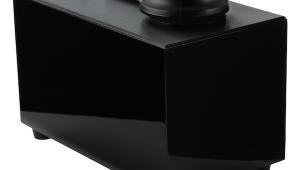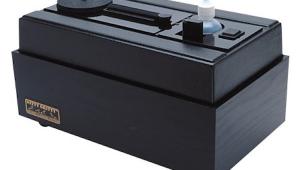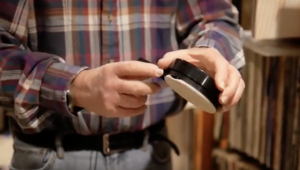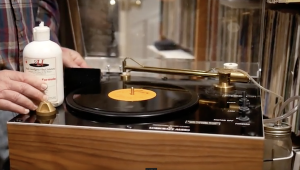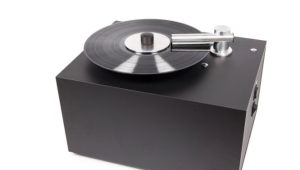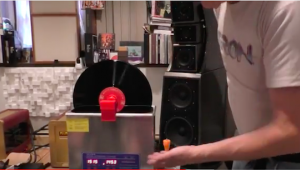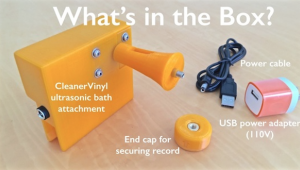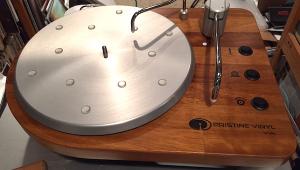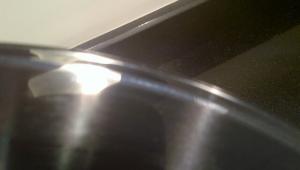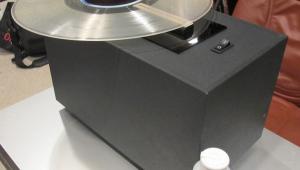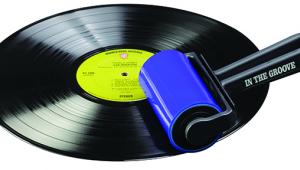I was wondering about the pro-ject, i like it! the vacuum wand I made one and it works very well but it needed to have a constant rpm for a more controlled cleaning. what is good for the dust in the air or from the sleeve, the little stuff, anti static brush? and as always your entertaining!
Thanks!
Another AnalogPlanet Record Cleaning Extravaganza!
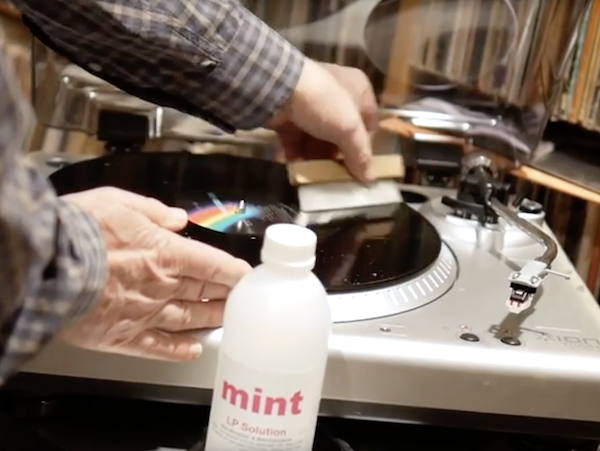
As with previous record cleaning videos, there are no "rehearsals". It's more fun to open and attempt to use as you might, rather than "get the hang" of them first.
The results are sometimes amusing but hopefully you'll find them instructive as well both as to what to do and what not to do!
- Log in or register to post comments


Hi Mikey.
It is not new, but the Spin Clean is still the best bang-for-your-buck, simple to operate, record cleaning system out there.
Think of all the records you could buy instead of spending so much on a vacuum machine.
Still enjoyed your video.

a wet system like the Spin Clean (which I have). Those two white drying rags the Spin Clean comes with do a fine job, but I first like to rinse the LPs with distilled water prior to drying w/the rags. I'm thinking that over time, the $30 wand will pay for itself in me not having to buy the water and extra rags (for those multi-LP cleaning sessions). I may go for this, as I already have a wet/dry pet vacuum and old platter that can be the lazy Susan.

I will go out on a limb and say the Spin Clean is the best record cleaning system on the market. Every other system is too loud, too slow, or looks like a pain in the ass to use. I do think sonic cleaning systems look great but the cost is a bit steep. Every record collector should at least own a spin clean. It's foolproof and the plastic is so retro ;)

"Every other system is too loud, too slow, or looks like a pain in the ass to use."
So..your criteria are everything BUT how well it cleans????

The Spin Clean cleans the record very well, without being clumsy and loud. Yep, the best especially for the price. I'd put my money on a spin clean over a vacuum system.

You're making a poorly informed bet. You'd put money on something because of a feeling? Doing a decent job, or a better job than nothing does not make a record cleaner "the best". "The best" is the best. After that, cost and effort come into the equation.
There HAVE been shootouts as to what types of cleaners and solutions work best. The best non-machine cleaning system I know of is the Disc Doctor system of brushes and fluids.
But ultrasonic cleaning machines have consistently proven to clean records better than standard record cleaning machines. The best vacuum type machine is generally considered to be a Keith Monk style machine with a string cleaning the machine. They're expensive, as are good ultrasonic cleaners.
Those who have compared the Spin Clean to a good vacuum or ultrasonic cleaning machine consistently say that the Spin Clean, by itself, is decent, but not as thorough. You don't get as deep a clean.
I have a Nitty Gritty built Record Doctor, hand-spun, vacuum cleaning machine. I use 3 different types of Mobile Fidelity fluids with it, depending on how dirty the records are. One has an enzyme cleaner which I only use if there is literally gunk on the record. The other two include a basic cleaner and a deep cleaner.
When I use the basic cleaner , the Super Record Wash, it gets the records respectably clean.
But when I use the Super Deep Cleaner prior to using the Super Record Wash, the background noise level of the vinyl drops. The background is blacker, quieter. It allows more low level details to be heard. Even midrange details are a hair more defined, because that extra level of cleaning allows the stylus to get into parts of the groove which has that subtle information.
So one has to decide priorities. A Spin Clean will get your records respectably clean. And if your system is a modest one, that may be sufficient, but you'd only know if you got to clean a record with a different, ostensibly "better" cleaning system. The higher end your system, the more you'll likely have spent on it and the more likely you'll hear the benefits of a cleaner record. Moreover, if your system cost $20,000, the less shocking a $4000 cleaner would be. And ALL of your records would get the benefit of such a cleaning system.
The VPI Cyclone, a $1200 retail vacuum record cleaning machine, is supposed to provide superb results. Yet Harry Weisfeld, the owner of VPI, acknowledges that he has gotten even better results from an ultrasonic machine. And not all ultrasonic machines provide the same level of result either, as one of Michael Fremer's videos talks about.
In the end, we're an audio, high fidelity enthusiasts community. The proof of the pudding is in the tasting, as the saying goes. So here, the "best" sound has to come from the trying and listening. It can't be a merely "What I'm doing is good enough and probably probably better."

I agree there are many options for record cleaners and respect your knowledge. I like the Spin Clean the best because #1 it's quiet, #2 it's fast, and #3 it works much better than the other designs I've seen especially under $500 #4 if the motor stops working you are dead. Sure you can assume since I use a Spin Clean that my system is midgrade. I've been using a SAS JICO needle for years and it doesn't like damaged or dirty records so clean records is important to me. Give me my SpinClean or the best Ultrasonic machine, the price difference is however staggering.
Maybe Fremer will do a comparison with a SpinClean versus an Ultrasonic. I'd watch that video. ;)

I’d like to point out a couple of things.
As I said previously, there is no such things in HiFi as “the best”, “perfect”, etc. It is all relative.
I’m not sure about the ultrasonic machines cleaning records better than other standard RCMs, but I can see where they could in some cases, it really depends on the record to begin with no matter the machine used. I am giving consideration with a couple of concerns, to getting one of these units one day, but the kit type, the other type I feel are prohibitively expensive considering the size of my library at least. (I have around 550 records, which is tiny by comparison).
I currently use a VPI 16.5 with AIVS fluids (for the past 4+ years) and I get excellent results. Not 100% mind you, one will always have that one record that is stubborn as hell and likely suffers more from damage then dirt, so it is better to just replace the record in those cases. I have been lucky in not having many of those, especially considering that 92% of my collection is bargain bin used records.
Fluids used are very important as well. I have tried many and settled on the AIVS fluids, but the MoFi fluids are good too as are at least a couple of others that have proven consistently good. I use the MoFi Super Wash as a maintenance cleaner myself. (I’ve tried other fluids as well that I cannot recommend in good mind). Of course, cross contamination precautions should be taken as well. While not like handling chicken, it is just good practice.
My last point is that the benefits of clean records depend nothing on the cost of a sound system. Damage notwithstanding, a record is either clean or it isn’t. One will get full benefits of a clean record on a $800 system as one would on a $80,000 system. It is mostly in setup, room and synergy of components.

The key is to remove the solution from the disc. Wiping it off does not do that; it leaves residue everywhere. Creating a bin a fluid is wasteful if one is doing a few lps, and it's a pain and inefficient, compared to applying a small amount of fluid per each lp. That's why vacuum machines have been excellent sellers for decades.
See the Audio Advisor Disc Doctor 2... it is amazing for $200. Clean discs, not almost clean discs. Cavitation cleaners are even better, but cost prohibitive for most.

I won't go into too much detail on how I clean records with the spin clean because it would just open me up for more of the, "your records aren't clean using a Spin Clean"
The Spin Clean is very efficient, I leave the water in the tank with the pads and rollers removed to air dry. The water will stay decent for a month in the tub. When I buy bargain bin records I'll pull it out and clean the records. I clean records and listen to music so again loudness is a real concern for me and I haven't seen any record cleaners as quiet unless it's using the same design as the Spin Clean.
I may someday break down and buy a vacuum system but when something works as well for me as the Spin Clean I just stick with it. I have no complaints and my records look and sound wonderful.
With this kind of endorsement, you'd think I worked for the company or at least sold the little yellow tubs but that is not the case. Let's do a shootout so I can eat my words. :)
Lastly, I will at least eat my words on saying it's the best. What I meant to say is it's the best for my needs. I'm extremely picky about any product I buy, at any cost and will return anything that doesn't enhance my life.
Keep that needle in the grooove.

don't amount to much. No one, nor me, is saying don't use the Spin Clean. To say it comes close to a vacuum machine is wrong, and it appears to be pure conjecture that you claim such. It simply appears that you haven't compared the clean lp from each and have an experienced opinion about it.
The reviews of RCMs and Ultrasonic RCMs all point to better performance and less hassle and waste. For the money, the Spin Clean is great... For $100 more, the AA Disc Doctor does even more by evacuating more of the dirty residue.
Furthermore, the scrubbing of the SC does not use pressure... for very dirty lps, using another direct-pressure scrubbing brush like the Music Direct $20 wet / dry brush is much more effective and less time-consuming.

I disagree as you know, but that's ok. Spin Clean for life.

The Spin Clean works great. Why change something that works for you?

I have a spin clean but I must be doing something wrong or expecting too much, while I know it is cleaning the records as my new copy of The Wall sounds much better post cleaning I still have pops and tics, all my records are new and to a greater or lesser extent they all suffer the same issue. So is it static and if so do I just get a Zeostat and be done with it.

What kind of needle/turntable do you have? That sounds more like a setup issue than a clean records issue. If you are having static issues the ZeroStat will work. I forgot about this thread. I have to admit I don’t clean my records as much as I should and only suffer from static issues at times. I only notice that when I lift records off of my Rega turntable with wool mat. From my experience Roy Gandy is right record cleaning is over done but I thinks it’s necessary if you have dirty records. No pun intended...

I have a brand new Technics SL-1500c and using the supplied Ortofon 2M Red cartridge, its all set up as per the manual, apart from the pops & Tics it sounds amazing, I was wondering if changing to a 2M Blue stylus would help.

I wouldn’t think the 2M would be that picky with setup/alignment. I’ve been using a JICO SAS on a Shure M97 cartridge for years and it’s really picky on alignment. If you haven’t used a protractor to align the needle, I’d start there first. I always align the needle instead of the cartridge body because sometimes needles aren’t aligned to the cartridge. If you are hearing the ticks and pops only on new pressings they could be bad pressings and no record cleaning machine will help that issue. Good luck that technics looks like a nice table and I’m sure it could handle a much better needle than the 2m.

I have to agree that your judgment is not completely informed, but it does have individual merit. The one thing about the HiFi hobby that the majority of folks involved do not understand is that it is all individual taste and preference. There is no “perfect”, no “magic bullet”, no “best” or anything like that. The only “best” there is would be in practices, such as record care in the sense of handling and storage and common sense in cleaning. Everyone resonates differently to music and gear.
I can prove that a vacuum RCM or an ultrasonic RCM will beat a Spin Clean and are easier to use. However, that is not the point. The point is that something is better than nothing and fiscal sense. There are many bad investments in HiFi one can make due to diminishing returns. That said though there are also wise investments one can make and one of those is record care. This does not mean got out and get the most expensive thing you can not afford. It means educate yourself and work within your means, but do it properly. The one down-side to the Spin Clean and devices like it, is air drying. For me personally, it never made sense to let a cleaned record sit out in a rack for a half hour letting all those contaminates settle back on it and end up putting away a dirty record again. If I had a Spin Clean I would get plenty of extra drying cloths, which is a far better method than air drying. The Spin Clean itself though is a decent record cleaning system at the on-set. If one has say 100 or so records, it makes no sense to invest in a $500+ RCM.
Yes, vacuum RCMs are loud, it is the nature of the beast, even the very expensive ultrasonic RCMS are nearly as loud. The whole idea to a vacuum RCM is that you immediately lift the fluid with the suspended dirts off the record while drying it at the same time and put the record away immediately. Most such as the VPI machines have a motor that turns the record for you and pretty much all you do is apply the fluid, spread it in some cases and flip switches. Far less labor than a Spin Clean type device or 100% manual set up. There are fully automatic machines, but they are prohibitively expensive. A vacuum RCM makes sense if you have around 300+ records and can save up for it or what have you. By the way, $500 for a good vacuum RCM is a bargain. With the exception of the slime (I don’t know what they were thinking), if the RCM is anything like their turntables and preamps and such, I would not hesitate to get one if one needs or wants. Watch Michael’s other videos on Project to see the effort put into their gear, they do everything right.
You are absolutely correct, every record collector, owner, and what have you should at least have a Spin Clean or similar as well as new poly inner sleeves, good cleaning fluids and know how to handle and store records. Keep that stylus clean too!

This is turning into quite the thread.
I do have a sizable collection and it's another reason I like the SpinClean. I can wash up to 50 records with only adding distilled water and a splash of the SpinClean fluid. I think it's a downside to buying a vacuum system only because you'll go through fluid much faster. I don't let the records dry clean for a number of reasons. 1. It takes longer 2. It doesn't clean the records as well. I have 3 sets of the Spin Clean cloths, but generally only use a set during most cleaning sessions.
I'm also a random cleaner so I generally don't clean large amounts of records at a time, but the Spin Clean is perfect if I need to clean a whole boxset etc. I clean generally for static issues, also when I buy new records, and used records I will clean them to give them new life. It might seem like a lot of work using a fully manual system but the SpinClean is such a great system, it's actually fun to use!
I agree and have finally settled on the DiskKeeper 2.0 inner sleeves. I found after a lot of searching they are the best for my needs. Keep spinning those records!

I've used an SpinClean for over a decade. I fought the fight, argued the debaters, soapboxed the value to quality virtues of the SpinClean! Not until I broke down and built a cleaning system (using a vinylvac wand) did I realize I was wrong. Piecing together a system using vacuum suction cost me less than an SC and the results are audibly/visually lightyears ahead of what I was used to. I've taken SC'd albums, played them, then cleaned them with my vinylvac and the difference floored me, and all for around $63 total. Don't get me wrong, learning and growing with an SC is great; but there's no reason to cheat yourself any longer.

Ok, this does pique my curiosity. I can see using something like the vinylvac on records that are really dirty, but not necessarily all the time. Can you list out what you use to clean records? What kind of brush, fluid etc. you use with the vinylvac?
Even though it seems I'm a little set in my ways, I'm always open to trying something else, especially if I can get better results. I've looked at the vinylvac before and liked the simplicity of the design and the cost is hard to beat. I will give it a shot. Thanks.

Email me at luceroj@gmail.com for the product/price breakdown. Trust me on this Atomlow!

I ordered a vinylvac that will arrive tomorrow. I will email you to get the details in a bit. Thanks.

I just used the vinyl vac for the first time today and it works alright but it's still sort of a pain to use. I don't hear or see any better results than simply using my Spin Clean then drying with the provided cloths. I can report back I'm still all about the Spin Clean, so trust me it's better for my needs. I'll still be singing the praises of the Spin Clean! I'm always up for a challenge though and I'm glad I could put it to the test.
Spin Clean still gives the best user experience in my book.
I'm going to peacefully clean some records with the Spin Clean while I listen to my records.

They are expensive, but there are nigh perfect.

Regarding non-ultrasonic machines... While I feel that Mikey uses way too much fluid on his demos, I know it doesn't take up the time that filling a bin and mixing requires for the Spin Clean. Shoot some fluid shots on the lp and begin scrubbing. Time is a consideration and has a direct effect on price, as time is money with every thing we do.

The Spin Clean is so loud, you can't hear yourself.

I have a few comments on Michael's demonstration:
1) I have an Okki Nokki, which is like an updated VPI, but a little smaller and a little less expensive. I like it very much because of the good two-way turntable and powerful vacuum. It's metal clad, so liquid doesn't affect the unit the way VPI's MDF gets soggy (I had one, I know...)
I find that an automatically rotating turntable gives you more predictable results; manual rotation is hard to do successfully and evenly, especially with one hand. I had a Nitty Gritty/Record Doctor and while it works OK, the motorized version is better. Going in both directions with a good scrub with the goat hair brush and some Art du Son liquid gets all the most offensive junk off.
2) I know its theoretically beneficial to have either a platter-less system or one where you put a removable cover during side one and remove it for side two. But..... this is really overkill because the dirt you want to remove is the deep, clingy stuff. Putting the clean side down doesn't really affect the clean side for long because the next thing I do when I'm playing the discs is to wipe the side with a carbon fiber brush prior to setting the stylus down. This removes any residual dust and static. I always let my discs rack dry for about 10 minutes and then there's really hardly anything on them to wipe off. Then a new non-paper sleeve (Diskkeepers are my current favorite) if you're not going to play it first.
But let's stop obsessing about dust like we're in the bunny-suit clean-room at Intel. Once you've wet washed, scrubbed and vacuumed both sides, there's scant contaminants left to worry about that a good carbon brush won't cure. I'd be interested in a cavitation unit, but it seems like you have to use ungodly amount of fluid for just a few discs, so for now, the Okki RCM at $500 strikes the right balance.
3) Last point on the velvet lips: Usually, before every other session, I take the velvet lips and brush them out with a nylon stiff bristle brush and that keeps the lips smooth and clean. If the lips become too saturated, you can sop up some of the liquid with a lint free cloth. Velvet lips will last for quite a while if you clean them regularly.

I’ve been using a VPI 16.5 for the last 4+ years and its still going. It is not soggy or falling apart. The only time the VPI machines will get soggy is if one is reckless with fluids trying to turn the RCM into a fish tank.
Yes, not only not only does an automatic turntable give more predictable results, but having had a manual DIY system prior to my VPI, it also prevents nasty repetitive motion injuries, which is partly why I got my VPI.
Putting the clean side down on a dirty platter of your RCM is not a matter of light dust. The contaminates found on records consist of all manner of things and most of it is protein based. For example, food particles from the kitchen mix with common house dust and becomes sticky. Those particles fall on the record and into the grooves and are hard to get off by mere brushing. That is why record cleaning fluids and RCMs exist and the point is that none of us live in a “clean-room” and records are not made in clean-rooms either. Regular dust is going to get on the record the second you take it out of the sleeve, but a carbon fiber or goat hair brush takes care of that bit. The point is that the dirty record you put on the turntable of the RCM also has all that other stuff, some of which gets deposited on the turntable. It only takes a second for the cleaned side to pick up whatever is on the turntable of the RCM and if it is made up of sticky proteins and such then the carbon fiber brush is only going to spread it and even grind it into the grooves and we can’t see what is in the grooves. This is also partly why air drying does not make sense to me. I think cloth drying is better and vacuum drying to be as good as it gets for now, but that’s me. I have read the arguments about how vacuum drying builds up static, that is true if you over-do it, just like using too much fluid. I found in the years I have been at it, that two revolutions with the vacuum are enough to get the record within seconds of being perfectly dry without static build up. Anymore than two revolutions and then you enter problems.
Price aside for a moment. One can get a cavitation unit for around $600 as a kit, but it will not have auto-dry. I am interested in just such a unit, but I agree with you, one of the things that keeps me from such an investment is the amount of fluid used to clean a mere 3 to 5 records before having to drain the tank and refill it. I find my VPI (in this case) and AIVS fluids to be highly effective even if a bit more labor is involved.
By the way, Diskkeeper sleeves are my favorite as well and all I use. I like them better than the MoFi sleeves in that they are a little easier in and out of the jacket. That said though, the MoFi sleeves are good as are a couple of other brands I have tried. The whole point is they are not the sandpaper sleeves records come with.
There are many good sub-$1000 RCMs out there: Okki Nokki, VPI, Project (assuming and knowing how they do things), Sota, etc. I think all are fantastic choices.

I had a first gen 16.0 VPI and it’s point of failure was where the tube met the top and the MDF was eaten away and created a vacuum loss. This was on the model with the wand integrated into the lid. I’m hoping in subsequent models, they made improvements. I’m a VPI Scout owner, so I dig their products in general. But the Okki has a smaller footprint and is a slightly better value for me .
I agree: I have no idea why anyone would want to wash a record and not vacuum out the scunge. If anyone has ever looked at the liquid at the bottom of an RCM tank, you’d be sure there’s a lot of deep dirt that the vacuum whisks away.

Ah, yes, the 16.5 is a completely different machine than the 16.0, that would explain our different experiences.
Yes, vacuuming is really the way to go, you should see the collection bottle I have for draining the tank. I sometimes get actual flax floating around in it. My personal theory is that if a stubborn record does not improve after 3 cleanings with various fluids and tweaks to method, then it is damage I'm hearing, you can't clean damage.

Hi, I bought the Project Vinyl Clean "blob" some months ago and found it good for cleaning dust from the AudioSonic Fan covers! BUT I am concerned about it leaving residue on records because the liquid residue collected after using DiscDoctor Miracle Record Cleaner following a clean with the blob has a green tinge as the blob. I don't have any fancy kit to chemically analyse it but it looks the same green colour. I am using the blob in place of a carbon fibre brush to pick up dust before applying DDMRC. I then wipe off some of DDMRC into a dish before rinsing the record and then ultrasonically cleaning - well if you are going to do it you might as well .... ps love the video

Hi after years of using all manner of manual systems and eyeing up systems I cant afford such as the new german wunderbox and the keith monks machine, I had one of these demonstrated by Pebble Records in Eastbourne, East Sussex (great store by the way) and it blew me away. Not only did it remove crap from an album I had just bought from a thrift shop, but it lifted sounds out of an "Its A Beautiful Day" classic that I'd owned for thirty years and which had always sounded "veiled" from day 1. (This is via a 401/SME3009/Ortofon 2m black/LebenCS300x/LebenRS30EQ/Proac set up, so audiophile but not crazy audiophile). Every disc I have cleaned on this machine sounds way improved. Some sound stunningly improved. The big advantage is the lack of faffing about with wet baths, drying racks, vacuum hoses, jelly sausages and the like. I have this machine set up in my study and it can do the business in a minute - dirty to dry. If I get a record that is really dirty I clean it in tepid water with a drop or two of detergent, rinse it and drain it before using the pro-ject. Simples. I really cannot recommend this machine highly enough. If I had the spare dosh I'd buy one of those german whizz-bangs, but for price point/bangs for bucks, this thing kills.

Great video. I made myself some wands from electric conduit and some velour strips. One for disc doctor and one for the distilled rinse. You don't really need a wet vac as there is so little moisture and so much tube - the moisture never gets as far as the motor. I thought about the bearing issue and so I recommend using a Jap-Crap turntable as a platform. I found mine in a rubbish pile (it actually worked....) Here's a short video : https://www.youtube.com/watch?v=HSCSH1B5Fd8 Enjoy -

THIS video is a perfect example of why one plans carefully in advance. ;-)

inexpensive, effective and so much less hassle than those klugy devices!

Michael:
What's the wood handled brush? I need one!

Just a warning from my own experience. Torumat TM7HX, or the current version, will damage the seals in Nitty Gritty machines and cause the vacuum seals and possibly the motor to have to be replaced. This is true at least with the fluid injection machines which I use. I have no idea if it's a problem with the non-fluid injection machines. Torumat is a great cleaner though, it just doesn't mix with the Nitty Gritty components apparently.

I have a manual Nitty Gritty and the Torumat hasn't shown to be any problem with mine, as far as I know.

no, I don't mean that in a disparaging way. I'm talking about the devices, the brushes, pads, fluids, machines and approaches. I have had great success with multiple approaches; some old records need more work than other, already pristine copies. Ultrasonic, vacuum, rinse steps, all bring something to the table. Convenience is a factor for some; for others, it's about the best possible results, no matter the time or effort. I got very good results from an old VPI (a 16 converted to a 16.5, positively ancient)--based on good practices: separate applicators and wands, keeping the applicators and wand lips scrupulously clean during the process, not over-vacuuming. That machine would not die- I gave it to a friend when I moved.
I do think there are different levels of "clean" that allow you to extract more information from the grooves. But, on a budget, a basic vacuum system or DIY ultrasonic can achieve very good results. My preference is to use both methods- vacuum and ultrasonic, but you can do that in steps without a huge outlay.

Spot on Bill, no pun intended. Exactly, what I tell folks all the time is that it is not the RCM that cleans the records itself, saved the fully automatic ones, but RCMs are really platforms to help us clean records with best practices. Best practices are what you stated, separate applicators (brushes), vacuum wands, keeping things clean, mats on those with platter machines and correct methods, fluids etc.
I am thinking about getting a DIY ultrasonic machine to use after my VPI and regular methodology, but I won't put my good records through any ultrasonic machine, just my stubborn ones. One thing holding me back besides budget is the amount of water those US machines use and the frequency in which it needs to be changed. It can get a bit costly to run a US machine all the time. On average they use about 1.5 gallons of water, which means I would be changing the water out about every 5 or 6 records or so.

high i mean hi
mike
entertaining video
made me chuckle a few times
happy new year

Michael,
When Pro-Ject sends you the correct 120V version of the VC-S hopefully they will send you the new MKII version.

A Spin Clean gets you to the point of diminishing returns. It is cheap, and effective. HOWEVER the SC does not completely clean an LP ! I initially used a SC alone. Yes LPs sounded better. Then I added dry step by using a Nitty Gritty machine. Better still. Then I constructed a DIY Ultrasonic machine, added a final rinse step, and moved the Nitty Gritty to last as a drying step. This is a -BIG- improvement. I use the SC to pre scrub all LPs, and I see a lot of debris in the SC tank. I rinse the surfaces, then move to the US tank. After a US clean I again -see a lot of debris- in the US tank. This is debris NOT removed by the SC alone. With just the SC/Vac I still had very low level background noise, sort of a shhhhhh/swshhhhh sound. The US process removes this sound, and results in an LP noise floor level below the noise floor of my system (assuming the LP is not damaged). I can now easily hear a fade out into silence or an abrupt low level cut off if the engineer cut the gain. I hear greater midrange clarity, greater HF extension, more air and space around musicians and greater sense of instrument decays. US removes the final layer of ingrained dirt that was bonded to the grooves by years of playing.
One can find a used Nitty Gritty for not much money. A DIY US machine can be constructed for about $450.
US cleaning is a game changer, but a SC is better than nothing, and does get you to the point of diminishing returns.

Are you reviewing the someone newly released Mkii version or the original?

I've been using the current version of the Torumat TM7HX solution, TM-8, to manually clean my records. For those that use this solution, do you feel it's necessary to do a final clean with just distilled water?

Hello Michael,
This is not really a comment but an attempt to reach-out.
I make this record cleaning tool and was wondering if you'd be interested in trying it out:
https://spindle-spinner.myshopify.com/
And I would also be very curious to hear what you think of these record cleaning tips:
https://spindle-spinner.myshopify.com/pages/record-cleaning-tips
All the best,
Bertrand
